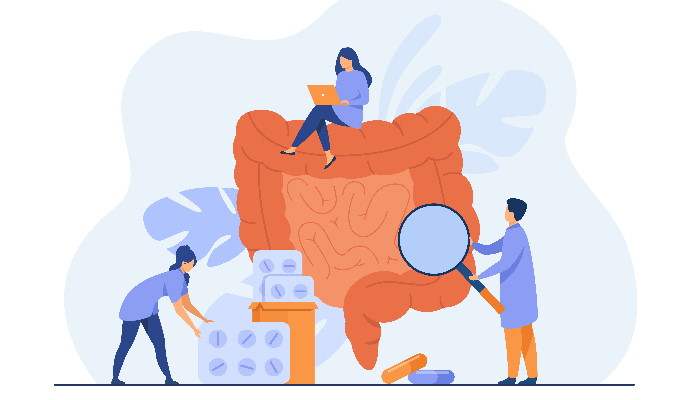
Persone vettore creata da pch.vector - it.freepik.com
The irritable colon syndrome or IBS (Irritable Bowel Syndrome) is a gastro-intestinal, chronic and debilitating functional disorder, of which about 1 in 5 people in the Western.
I can suspect that we are facing a case of Irritable Colon Syndrome when we experience a feeling of abdominal pain or discomfort, recurrent for at least 3 days a month in the last 3 months, associated with two or more of the following events:
- Improvement of pain or discomfort following elimination
- Onset of pain or discomfort in conjunction with the change in the frequency of evacuation
- Onset of pain or discomfort in conjunction with the variation in the appearance of the feces
These symptoms must be present for at least 6 months in order to make a diagnosis of irritable colon syndrome.
Diagnosis of Irritable Colon Syndrome
Making a correct diagnosis, however, is complicated, as this syndrome can be presented in various forms:
- Sytypical: in which the subject presents mostly jambs, therefore hard or caprine feces
- Diarrhoea: in which the subject presents mostly liquid or semi-formed feces
- Mixed: in which the subject alternates episodes of stipsis and liquid feces (alternating alvo)
For some patients, however, irritable colon syndrome may prove disabling: you may no longer be able to work, make social life, or even make trips even if short.
No specific therapy has yet been discovered, but there are several possibilities of detete symptoms: your doctor will prescribe the best therapy for specific symptoms and encourage you to keep stress under control and change your diet.
Nutritional therapy, in these cases, is to follow what is called a low-FODMAP,
What are FODMAPS?
The term FODMAP stands for Fermentable Oligosaccharides, Disaccharides, Monosaccharides And Polyols. These are, therefore, short-chain carbohydrates that cause the greatest symptoms of irritable colon (constipation, swelling, accelerated transit, meteorism).
The FODMAP are contained in a number of foods such as wheat, certain types of fruits and vegetables and some milk products. Depending on the food, we can find FODMAP different:
- THE FOS (Fruit- and Galatto-oligosaccharides): are found in cereals, such as wheat, barley, rye, oats; in legumes, such as lentils and chickpeas; in the onion, leek, garlic, shallot; artichokes, fennel, chicory, red turnips, peas, cashews and pistachios.
- The Disaccharides: we refer mostly to lactose, contained in milk and derivatives (pudding, ice cream and yogurt).
- The Monosaccharides: we are essentially talking about free fruit, which we find in some fruits, such as apples, pears, mango, cherries, watermelon; in honey and glucose and fructose syrup.
- The Polioli: contained in everything that ends with –olo, then xylitol, mannitol, maltitol, sorbitol. They tend to be sweetening molecules found in chewing gum and light products. Polyols are also present in fruit with hazelnuts such as peaches, plums, cherries, apricots, as well as in mushrooms and cauliflower.
Remedies Irritable Colon Syndrome
In the low-FODMAP diet we distinguish 3 steps:
- The first phase involves the complete exclusion of foods containing fodmap for a period of 4 to 8 weeks. This phase must be addressed under the supervision of a qualified and experienced professional.
- The second phase is the phase of retroduction. Depending on the symptoms it will be determined which foods, and how often, will be reintroduced.
- In the third phase the autogestion long-term type of symptoms, with the consumption of FODMAP foods up to tolerance.
A diet of this type represents a real advailing therapy in the treatment of irritable bowel syndrome, without having to resort to pharmacological or medical-surgical treatments, also affecting the economic impact that these pathologies have on the cost of health.
Unfortunately, foods that can worsen the situation are not common to all patients, so a patient work of inserting/excluding foods from the diet is necessary to detect those that actually cause reactions by noting them in a food diary.
Curated by
Dott.ssa Patalano Myriam Biologist Nutritionist
Ischia Nutrizione Patalano
